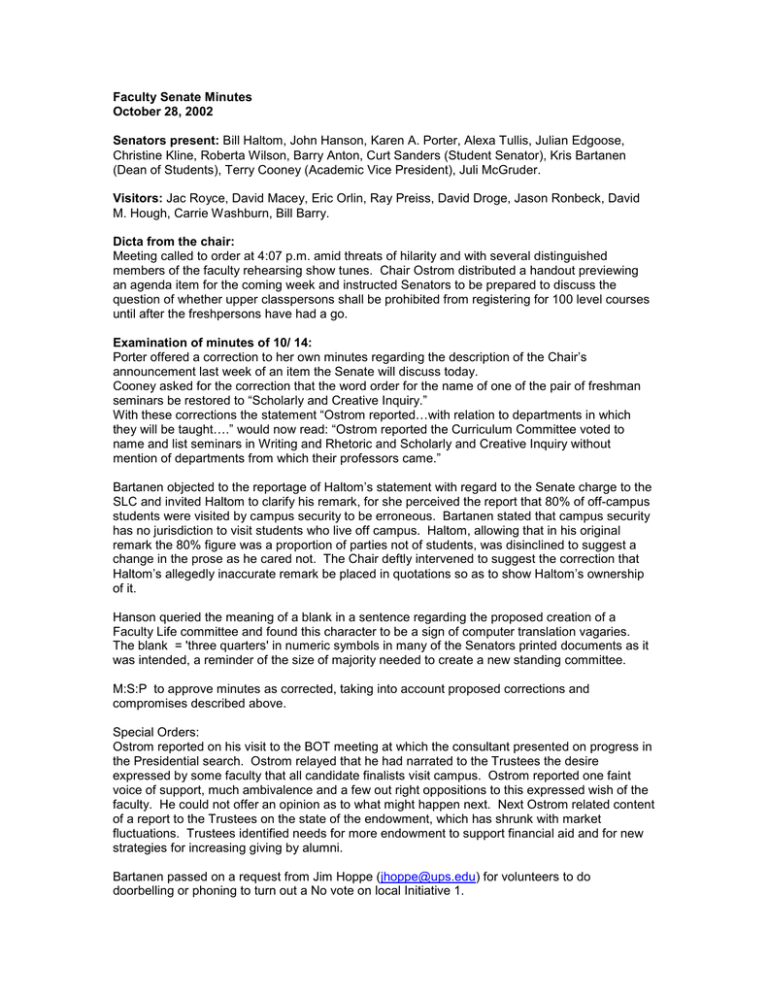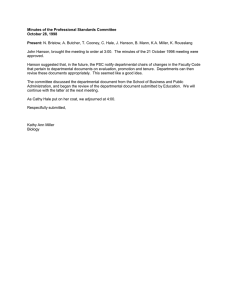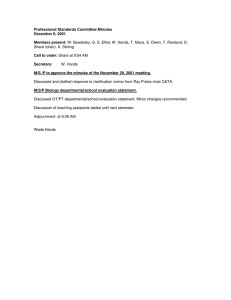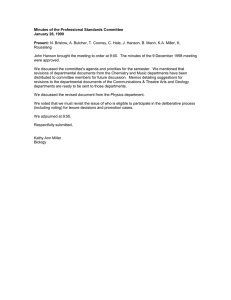Christine Kline, Roberta Wilson, Barry Anton, Curt Sanders (Student Senator),... (Dean of Students), Terry Cooney (Academic Vice President), Juli McGruder.
advertisement

Faculty Senate Minutes October 28, 2002 Senators present: Bill Haltom, John Hanson, Karen A. Porter, Alexa Tullis, Julian Edgoose, Christine Kline, Roberta Wilson, Barry Anton, Curt Sanders (Student Senator), Kris Bartanen (Dean of Students), Terry Cooney (Academic Vice President), Juli McGruder. Visitors: Jac Royce, David Macey, Eric Orlin, Ray Preiss, David Droge, Jason Ronbeck, David M. Hough, Carrie Washburn, Bill Barry. Dicta from the chair: Meeting called to order at 4:07 p.m. amid threats of hilarity and with several distinguished members of the faculty rehearsing show tunes. Chair Ostrom distributed a handout previewing an agenda item for the coming week and instructed Senators to be prepared to discuss the question of whether upper classpersons shall be prohibited from registering for 100 level courses until after the freshpersons have had a go. Examination of minutes of 10/ 14: Porter offered a correction to her own minutes regarding the description of the Chair’s announcement last week of an item the Senate will discuss today. Cooney asked for the correction that the word order for the name of one of the pair of freshman seminars be restored to “Scholarly and Creative Inquiry.” With these corrections the statement “Ostrom reported…with relation to departments in which they will be taught….” would now read: “Ostrom reported the Curriculum Committee voted to name and list seminars in Writing and Rhetoric and Scholarly and Creative Inquiry without mention of departments from which their professors came.” Bartanen objected to the reportage of Haltom’s statement with regard to the Senate charge to the SLC and invited Haltom to clarify his remark, for she perceived the report that 80% of off-campus students were visited by campus security to be erroneous. Bartanen stated that campus security has no jurisdiction to visit students who live off campus. Haltom, allowing that in his original remark the 80% figure was a proportion of parties not of students, was disinclined to suggest a change in the prose as he cared not. The Chair deftly intervened to suggest the correction that Haltom’s allegedly inaccurate remark be placed in quotations so as to show Haltom’s ownership of it. Hanson queried the meaning of a blank in a sentence regarding the proposed creation of a Faculty Life committee and found this character to be a sign of computer translation vagaries. The blank = 'three quarters' in numeric symbols in many of the Senators printed documents as it was intended, a reminder of the size of majority needed to create a new standing committee. M:S:P to approve minutes as corrected, taking into account proposed corrections and compromises described above. Special Orders: Ostrom reported on his visit to the BOT meeting at which the consultant presented on progress in the Presidential search. Ostrom relayed that he had narrated to the Trustees the desire expressed by some faculty that all candidate finalists visit campus. Ostrom reported one faint voice of support, much ambivalence and a few out right oppositions to this expressed wish of the faculty. He could not offer an opinion as to what might happen next. Next Ostrom related content of a report to the Trustees on the state of the endowment, which has shrunk with market fluctuations. Trustees identified needs for more endowment to support financial aid and for new strategies for increasing giving by alumni. Bartanen passed on a request from Jim Hoppe (jhoppe@ups.edu) for volunteers to do doorbelling or phoning to turn out a No vote on local Initiative 1. Sanders brought Senators up-to-date on recent ASUPS actions, which included presenting a budget with a request for a fee increase, expressing concern about the blackface incident involving the band Biznautics as part of the Homecoming festivities, and announcing speakers on topics ranging from drunk driving to war on Iraq. Hanson encouraged faculty to express to him their input on the Presidential search, especially as it moves beyond the hypothetical to examine actual candidates. Presentation of the revised “Statement on Diversity” Jac Royce presented briefly on the revised statement on diversity that has come to the campus community from the Diversity Committee. She noted that the Student Senate had approved the text as had the legal consultants attached to the President, with some revision from the latter. She noted that Faculty Senate approval would be the next step before the statement was taken to the BOT Committee on Academic and Student Affairs. She allowed as how the BOT had actually already seen the statement ‘informally’ at its August meeting and had objected to the inclusion of work in the penultimate bullet point as they were concerned that workers might interpret this to mean that their educational desires could actually take precedence over their work responsibilities. Bartanen M:S:P removing the words “and work” from the penultimate bullet point and most Senators agreed. There were four abstentions. Cooney M:S:P endorsement of the statement as amended, netting many ‘ayes’ and two abstentions. Discussion of how to list and where to ‘locate’ the new freshperson seminars in Writing And Rhetoric (hereafter WR, or occasionally WRS) and Scholarly and Creative Inquiry (hereafter, SCIS): Having before it two documents that offered opposing rationale for how to label the new seminars—minutes of statements made in a Curriculum Committee (hereafter CC) meeting of 10/3 and J. David Macey’s letter to colleagues (undated)—the Senators launched into a discussion of this issue. Tullis first interrogated the rationale (from CC minutes) that dual listing would prove too expensive, by asking for an actual cost estimate. Cooney said this would depend upon the number of pages and Washburn estimated 20 pages simply to describe all of the new courses once and, in the worst case, doubling that. Hanson opined that, regardless of the solution to the question, offerings would be cross-listed. Wilson expressed concern about the ability of graduate schools to interpret the sort of separate course labels (WR, SCIS) that the Curriculum Committee had come to favor. Bartanen noted that the decision made would affect the bulletin where cost is an issue but that a full menu of students’ options would be usefully and inexpensively displayed in the newsprint schedule and the on-line listings. Hanson proffered the hypothetical that any course he might offer in one of the two new rubrics would not be a chemistry course per se and that the generic WR or SCIS listing would solve that problem. Haltom did not see it as a problem. Those courses, he argued, that did not fit easily in the label of their proposers’ home departments might have a separate listing. Cooney strove to separate the issue of WR and SCIS courses. The former he observed come primarily from C & TA and English department; departments that had “strong ideas” on this question, whereas the latter are, so far, more often interdisciplinary or not a tight fit with the departmental disciplines of their proposers. Haltom sought to refocus discussion from one concentrated on communication with students to observe that course labels had communicative value for departments themselves. He brought up issues of departmental service to the core and potential for recruitment of majors via these first year offerings, both of which would be recognized with use of departmental prefixes like (PG, ENGL). Cooney pointed out that the faculty in approving this part of the new core made it clear that the two seminars could not used as departmental requirements to serve the major but must serve only the core. Haltom expanded upon an argument from the Macey letter, to whit: because writing is practiced across the curriculum, use of many departmental labels would reflect this and not situate writing in an “implicitly unequal place.” Haltom extended the “implicitly unequal place” notion to contemplate an unequal burden or unequal service by departments to the new core seminars. He said that listing the courses by department of offering would allow us to see which departments are supplying the new seminars. He recounted the evolution of SCIS from passion seminars, which were originally intended neither to be counted toward the major nor to be necessarily interdisciplinary, but rather to reflect the disciplinary homes of their proposers. “That,” he reminded the Senators, “is what the faculty passed.” He expressed the concern that having the seminars “living at a level above” and not grounded in departments would lead to “dilettantism.” Barry expressed concern that departmental labels would constrain these new courses toward becoming disciplinary introductions. He saw this a particular concern for the courses in the SCIS rubric. Barry regarded extra-departmental labels (like WR or SCIS) as not detracting from the value of the problematic departmental ownership issues (such as the need for departmental endorsement or chair sign off). Preiss noted a difference between the argument just put forth by Barry and the discussion described in the CC minutes. He stated that C & TA favored departmental labels for the sake of informing students. Hanson argued for a look at the pattern of information from the student’s perspective and said that he favored clustering these courses. He expressed the hope that such a clustering would embolden students to diversify their choices. Kline—a member of both Senate and CC —disagreed with Haltom and spoke in favor of a separate designation for WR and SCIS courses because this would encourage freshpersons to exercise access to a range of courses as they would be uninhibited by departmental labels. Tullis took issue with the idea (from Preiss) that departmental labels would add information value to course titles. She pointed to her own proposed course on science and the media as one that would decidedly not be enhanced with a BIO moniker. In fact such a departmental label would be misinformation. Haltom returned to his point about dilettantism as a potential outgrowth of supra-departmental homes for interdisciplinary courses. Hummel-Berry returned to the point about the audience for the labeling convention to be produced being freshpersons and suggested that the among the mailings such students and their advisors get might be a sheet of just those courses that satisfy the two new seminar core requirements. Cooney disagreed with this suggestion based on the time frame for freshmen selecting courses, part of which is before arrival on campus and access to advising. Sanders pleaded for students to get full descriptions of the courses that satisfy these cores in two separate listings, one departmental and one extra-departmental. Preiss suggested that an imposition of word limits on course descriptions might minimize printing costs. Barry opined that the cost issue was really the least important of the arguments in favor of extradepartmental labels of those he himself had raised at CC. He stated that not all freshperson seminar courses will be interdisciplinary but some will. He pointed to the compromise offered in the CC minutes that course description text could include phrases like “this course will appeal to students with interests in” X or Y or Z majors. Jasiniski lamented his inability to attend the CC when this issue was raised there and the decision taken to list courses with extradepartmental labels. He found the minutes of the CC’s discussion wanting. He spoke against letting cost drive the decision. Barry responded that we should not become bogged down in the cost issue. He offered concern about a hypothetical professor bringing forward a course that is clearly non-disciplinary and suffering pressure to have that course molded in a disciplinary direction if it were given a departmental home and label. Haltom responded to several arguments reiterating that departmental labels should be used but that in the event that a course had no true departmental home, using BIO in a hypothetical example, it might be given a special designation Cooney exhorted the assembled to be concerned less with structural and pragmatic questions than with the deeper conceptual one of what we want the core to say. Freshman seminars, he stated, were things we agreed to think of as separate and not disciplinary. He saw departmental labels as incompatible with that agreed upon vision. Cooney again thought an amicable solution might come with separating the issues and allowing WR courses to carry an ENG, a CTA or a special WRS label while SCIS courses would have their own special moniker. Porter raised the concern that detachment of courses, via this labeling process, from the departments of their proposers might affect hiring, teaching load allocation and retention of faculty FTEs. Cooney recounted some recent adjustments in staffing related to implementation of previous core curriculum changes. Other changes would be anticipated, he said, though no particular cadre of instructors is at risk. Preiss spoke again for use of departmental labels. He noted that every tenure line faculty member in Communication will be offering a WR course and having C & TA labels on those would demonstrate the range of interests of a diverse faculty. “This is not recruiting,” he summed up, “this is who we are.” Cooney promised that, regardless of decision taken, courses for WR and SCIS would be cross listed. The crucial question was whether the descriptions for same would be under departmental listing or under a separate heading in the bulletin. Haltom, Washburn, Cooney, Preiss, Ostrom, Bartenan and Barry bandied about numbering and lettering schemes. Cooney, Anton and Kline used the example of Tullis’s WRS course about science and the media, which is not a biology course, and argued it should not be listed as such, despite Tullis’s home in biology. They too put forth some numbering and lettering ideas. At this point Washburn informed the group of some constraints with regard to use of numbers and letters in the computer program that manages registration (eg. It does not accept the ampersand. It only reads letters following three digit numbers as section designations). Washburn also provided clarification on the difference between “cross-listing,” which actually means to give a course two titles and two numbers in two different departments and “cross-referencing,” which means to list a course with one title and one number in two different places in the bulletin. For the latter the convention is usually to give the full course description only in one place. Hanson tried to redirect the Senate attention to the fundamental intellectual question. Discussion turned back to tensions between departmental and university needs. Ostrom disagreed that these tensions would be paramount, stating that they had not yet affected the likelihood of chairs signing off on proposals in other core areas. The tensions, he argued, were in the people, not inherent in the courses or their labels. Barry argued that departmental labels would create tension and reinforce dual roles for core courses. Macey argued that the curricular approval process would control these tensions and that such difficulties were not a function of the letters that headed course titles but rather of the roles of the people offering courses. Apparently noting the late hour, Ostrom attempted to summarize the discussion to that point and query about next actions. McGruder also attempted to summarize the two possible positions on the matter and recommended an action opposite of that which the CC had agreed upon; that is, she recommended courses have departmental labels, even taking the position that a course taught by a biology teacher should carry a BIO label. M:S: Courses will be listed primarily in departments with departmental prefixes. Kline argued against making a decision while Senators were tired and frustrated and furrowing their respective brows. Haltom M:S:P we adjourn, which mercifully is not debatable and Senate was adjourned at 5:34. Respectfully submitted, Juli McGruder Anthropologist, Occupational Therapist, not journalist, not folklorist, not parliamentarian, but your Secretary du jour


